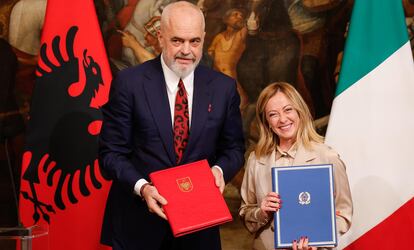Italy’s lower chamber of parliament OKs deal with Albania to house migrants during asylum processing
European Commission President Ursula von der Leyen has endorsed the deal as an important initiative and the fruit of necessary ‘out-of-the-box’ thinking to address the migration issue

Italy’s lower chamber of parliament on Wednesday approved a novel government deal with Albania to house migrants during the processing of their asylum requests, a cornerstone of Premier Giorgia Meloni’s efforts to share the migration burden with the rest of Europe.
The proposal, which passed 155-115 with two abstentions in the Chamber of Deputies, now goes to the Senate, where Meloni’s right-wing forces also have a comfortable majority.
Meloni and Albanian Prime Minister Edi Rama announced the groundbreaking initiative last November, in which Albania would shelter up to 36,000 migrants for a year in two centers while Italy fast-tracks their asylum requests.
Italy has long sought concrete gestures of solidarity from fellow European Union nations to help it handle the tens of thousands of migrants who arrive each year. Albania is hoping to join the bloc, and Italy has been a strong supporter of its bid.
European Commission President Ursula von der Leyen has endorsed the deal as an important initiative and the fruit of necessary “out-of-the-box” thinking to address the migration issue.
But human rights groups have expressed concern that Italy is outsourcing its international obligations and the Council of Europe’s human rights commissioner, Dunja Mijatović, has said the deal could deprive the migrants of crucial human rights safeguards and prolong their suffering. In a report, she said it amounts to “an ad hoc extra-territorial asylum regime characterized by many legal ambiguities.”
Italy’s center-left opposition has branded the deal as an expensive exercise in propaganda ahead of European elections this June and a shameful bid to turn Albania into Italy’s “Guantanamo.”
The text of the accord approved Wednesday says the deal would cost Italy nearly 600 million euros over five years, to build and staff the centers in Albania and set up the remote screening processes, money the opposition says could be better used to reinforce Italy’s existing migrant processing centers.
Democratic lawmaker Laura Boldrini, a former spokeswoman for the U.N. refugee agency in Italy, said the deal was mostly a public relations campaign by the Meloni government to give Italian voters the impression that migrants aren’t arriving in Italy anymore.
She criticized in particular the preliminary screening that the migrants would undergo at sea aboard Italian vessels to determine who among them are considered “vulnerable,” including unaccompanied minors, pregnant women but also victims of trafficking and rape. Those people could be brought to Italy to have their asylum cases processed here, rather than remotely from the Albanian centers.
“They say, because it is not written anywhere, that no trafficking victims, women victims of rape, of torture will be sent (to Albania),” Boldrini said. “But how will they determine and screen them? It’s not like it’s written on their faces.”
Lawmaker Augusta Montaruli of Meloni’s Brothers of Italy party said all legal guarantees surrounding asylum bids would be given to the migrants aboard the ships, and then in Albanian centers, that would be available to them in Italy.
She defended the deal as an important part of the government’s overall migration policy, which has involved a deal with Tunisia to facilitate legal migration and a broad development project for Africa.
Even though only 36,000 migrants a year might be sent to Albania, she said the deal was worth the cost because it would enable Italy’s migrant processing centers to work better and faster to screen candidates for possible asylum, without getting overwhelmed. Last year nearly 160,000 migrants arrived in Italy via boat, most departing from Tunisia or Libya.
“Albania is not doing anything more or less than what European member states should have done with Italy,” she said.
Albania’s constitutional court in December suspended ratification of the deal pending a review of its constitutionality, but Rama has said he is confident the court would find no violation. The court this week postponed the next session of its consideration to Jan. 29, to review further documentation related to the case.
Sign up for our weekly newsletter to get more English-language news coverage from EL PAÍS USA Edition
Tu suscripción se está usando en otro dispositivo
¿Quieres añadir otro usuario a tu suscripción?
Si continúas leyendo en este dispositivo, no se podrá leer en el otro.
FlechaTu suscripción se está usando en otro dispositivo y solo puedes acceder a EL PAÍS desde un dispositivo a la vez.
Si quieres compartir tu cuenta, cambia tu suscripción a la modalidad Premium, así podrás añadir otro usuario. Cada uno accederá con su propia cuenta de email, lo que os permitirá personalizar vuestra experiencia en EL PAÍS.
¿Tienes una suscripción de empresa? Accede aquí para contratar más cuentas.
En el caso de no saber quién está usando tu cuenta, te recomendamos cambiar tu contraseña aquí.
Si decides continuar compartiendo tu cuenta, este mensaje se mostrará en tu dispositivo y en el de la otra persona que está usando tu cuenta de forma indefinida, afectando a tu experiencia de lectura. Puedes consultar aquí los términos y condiciones de la suscripción digital.








































